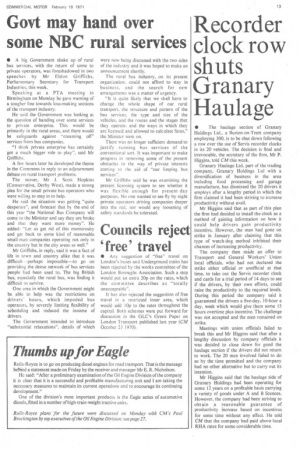Govt may hand over some NBC rural services
Page 15

If you've noticed an error in this article please click here to report it so we can fix it.
• A big Government shake up of rural bus services, with the return of some to private operators, was foreshadowed in two speeches by Mr Eldon Griffiths, Parliamentary Secretary for Transport Industries, this week.
Speaking at a PTA meeting in Birmingham on Monday he gave warning of a tougher line towards loss-making sections of the transport industry.
He said the Government was looking at the question of handing over some services to private enterprise. This would be primarily in the rural areas, and there would be safeguards against -creaming off" services from bus companies.
"I think private enterprise has certainly got a much bigger role to play", said Mr Griffiths.
A few hours later he developed the theme in the Commons in reply to an adjournment debate on rural transport problems.
The mover, Mr J. Scott Hopkins (Conservative, Derby West), made a strong plea for the small private bus operators who were willing to step in to help.
He said the situation was getting "quite desperate", and forecast that b3, the end of this year "the National Bus Company will come to the Minister and say they are broke and that they want more money". He added: "Let us get rid of this monstrosity and get back to some kind of reasonable small man companies operating not only in the country but in the city areas as well."
Mr Griffiths, in reply, said it was a fact of life in town and country alike that it was difficult----perhaps impossible—to go on providing the dense network of bus services people had been used to. The big British bus, especially the rural bus, was finding it difficult to survive.
One area in which the Government might be able to help was the restrictions on drivers hours, which impeded bus operators, by severely limiting flexibility of scheduling and reduced the income of drivers.
The Government intended to introduce "substantial relaxations", details of which were now being discussed with the two sides of the industry and it was hoped to make an announcement shortly.
The rural bus industry, .on its present organization, could not afford to stay in business, and the search for new arrangements was a matter of urgency.
"It is quite likely that we shall have to change the whole shape of our rural transport, the structure and pattern of the bus services, the type and size of the vehicles, and the routes and the stages that they operate, and the ways. in which they are licensed and allowed to calculate fares," the Minister went on.
There was no longer sufficient demand to justify running bus services of the conventional sort. It was important to make progress in removing some of the present obstacles in the way of private interests coming to the aid of "our limping bus services".
Mr Griffiths said he was examining the present licensing system to see whether it was flexible enough for present-day purposes. No one wanted to see fly-by-night private operators driving companies deeper into the red, nor would any loosening of safety standards be tolerated.





























